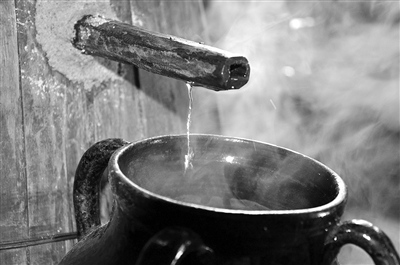


(File photo)
People in the 21th century may have the chance to taste what beer was like 5,000 years ago, after a pair of breweries in Beijing and Hong Kong attempt to bring ancient Chinese beer back to life, according to a report by the Science and Technology Daily.
The two breweries, Jing A from Beijing and Mengshen from Hong Kong, were inspired by recent archaeological findings, in which a 5,000-year-old formula for beer was published, originally created in an ancient brew house in China’s Xi’an, Shaanxi province.
The brew house is part of the Mijiaya historic site, where an archaeological group from Stanford University conducted research, uncovering ancient brewing equipment and vessels.
“The tools and vessels are the same as those that people use in modern times; the difference lies in the formula,” said Liu Li, a professor of archaeology at Stanford University. By analyzing the remains of ancient beer, archaeologists found that it was made from millet, barley, pearl barley and bit of rhizome plants, which is different from modern beer, which mainly feeds on barley and wheat.
So what is the flavor of beer from over 5,000 years ago? Liu said it is totally different from today’s beer.
“It would taste like a sweet wine that is low in alcohol, a little sour and without any visible bubbles.”
 Fire brigade in Shanghai holds group wedding
Fire brigade in Shanghai holds group wedding Tourists enjoy ice sculptures in Datan Town, north China
Tourists enjoy ice sculptures in Datan Town, north China Sunset scenery of Dayan Pagoda in Xi'an
Sunset scenery of Dayan Pagoda in Xi'an Tourists have fun at scenic spot in Nanlong Town, NW China
Tourists have fun at scenic spot in Nanlong Town, NW China Harbin attracts tourists by making best use of ice in winter
Harbin attracts tourists by making best use of ice in winter In pics: FIS Alpine Ski Women's World Cup Slalom
In pics: FIS Alpine Ski Women's World Cup Slalom Black-necked cranes rest at reservoir in Lhunzhub County, Lhasa
Black-necked cranes rest at reservoir in Lhunzhub County, Lhasa China's FAST telescope will be available to foreign scientists in April
China's FAST telescope will be available to foreign scientists in April "She power" plays indispensable role in poverty alleviation
"She power" plays indispensable role in poverty alleviation Top 10 world news events of People's Daily in 2020
Top 10 world news events of People's Daily in 2020 Top 10 China news events of People's Daily in 2020
Top 10 China news events of People's Daily in 2020 Top 10 media buzzwords of 2020
Top 10 media buzzwords of 2020 Year-ender:10 major tourism stories of 2020
Year-ender:10 major tourism stories of 2020 No interference in Venezuelan issues
No interference in Venezuelan issues
 Biz prepares for trade spat
Biz prepares for trade spat
 Broadcasting Continent
Broadcasting Continent Australia wins Chinese CEOs as US loses
Australia wins Chinese CEOs as US loses